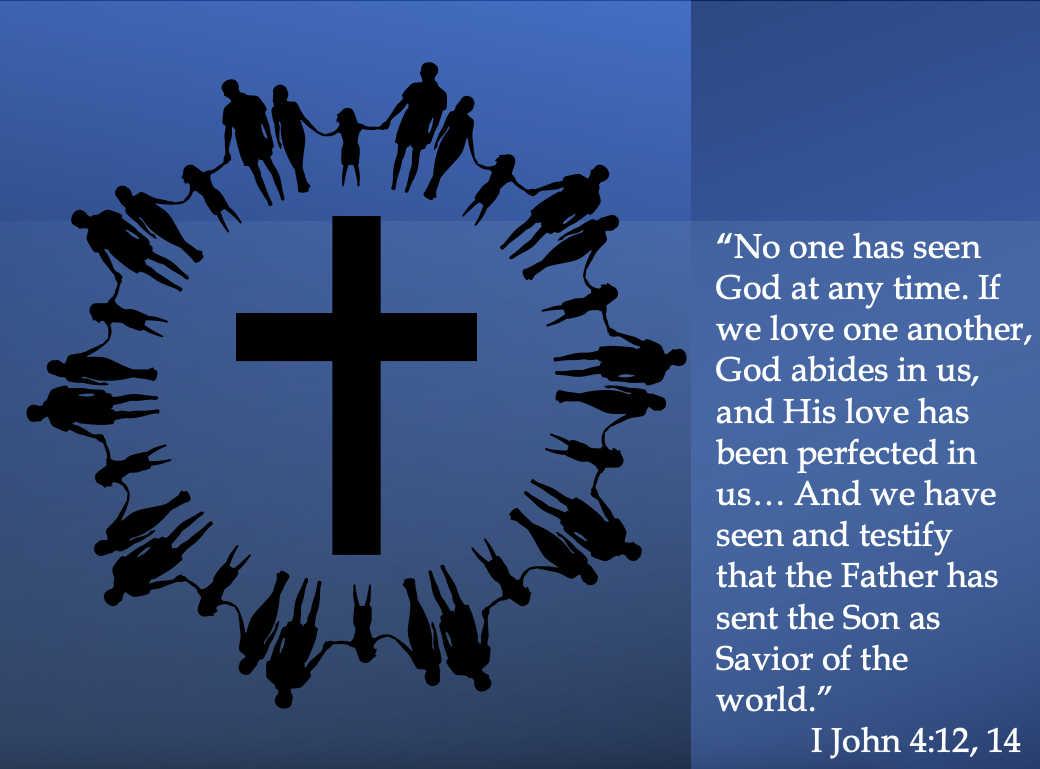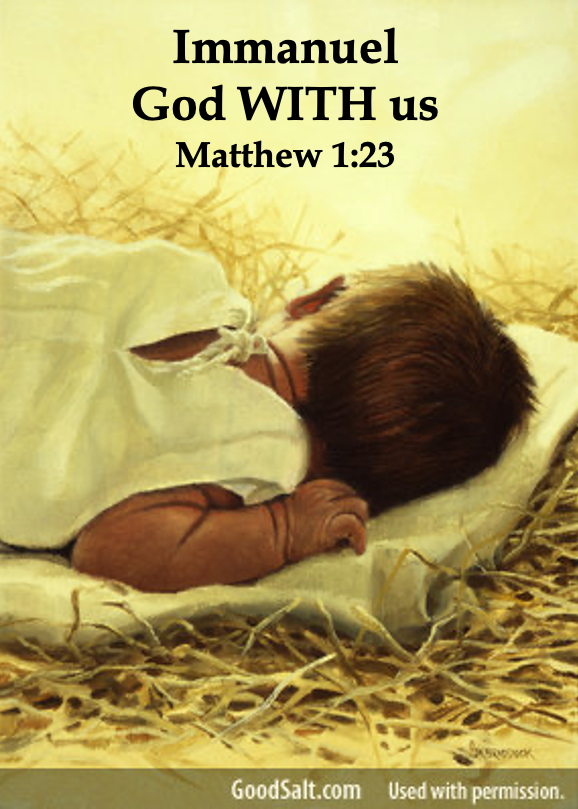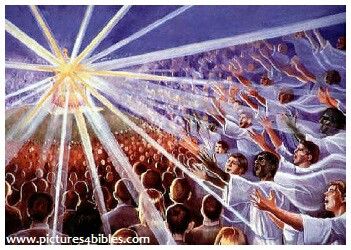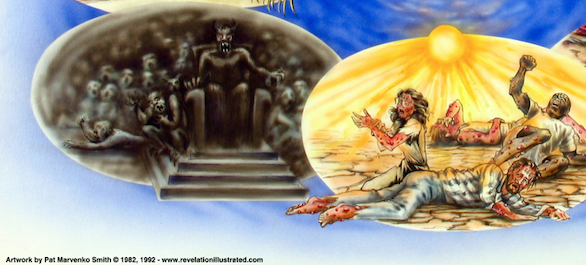“Now a great sign appeared in heaven: a woman clothed with the sun, with the moon under her feet, and on her head a garland of twelve stars.” Revelation 12:1
If you are a Christian, you are familiar with God’s love for you. Jesus said, “For God so loved the world…” (John 3:16). The world includes you and me. God loves us!!! The apostle Paul wrote, “But God demonstrates His own love toward us, in that while we were still sinners, Christ died for us.” (Romans 5:8). God showed how much He loved us by dying in our place “while we were still sinners.” God did not wait for us to clean up our lives and become “worthy” of His love. Even when we were at our worst, God loved us by giving His best for us when He took our punishment for sin on the cross.
As much as God loves us, we need to understand that Satan hates us. Swindoll writes, “Never forget those three words if you love and follow Christ’s teachings. Satan wants nothing more than to sabotage our love for God and for others, to tempt us into a moral catastrophe, and to see us choose a lifestyle of sin rather than a walk with the Lord Jesus Christ. When we falter, he stands ready to accuse us before God. When we pass the tests of temptation, he looks beyond that and is already strategizing his next attack. Satan’s hatred of us is relentless.
“… Understanding that Satan is neither all-powerful nor completely powerless will help us come to terms with the real challenges we face as we do battle with Satan’s evil empire in its current form. I say ‘current form’ because it’s important to understand that Satan’s ability to unleash his fury on God’s people is limited in the present age. However, one day Satan’s empire will be allowed to strike the world in full force before crumbling at the coming of Christ.” 1
You may recall that the apostle John received instructions to“prophesy again,” a second time regarding the seven-year Tribulation “about many peoples, nations, tongues, and kings” in Revelation 10:11. Therefore, Revelation 11-19 surveys the seventieth week of years (Tribulation) a second timewith a view to revealing the specific characters on the stage of the drama. In Revelation 11, John reviews the first half of the Tribulation with a focus on the Two Witnesses whom God will bring directly to faith in Christ so they can proclaim the truth to the world from Jerusalem (11:1-6), resulting in the salvation of the 144,000 Jewish evangelists (“firstfruits” – 14:4) who will proclaim the “gospel of the kingdom” during the last half of the Tribulation period (cf. 7:1-10) to “all the nations” (cf. Matthew 24:14).
At the end of Revelation 11, the seventh trumpet sounded to prepare the apostle John, and his readers for the seven horrific bowls of wrath (cf. Revelation 16) immediately before Christ returns to set up His kingdom on earth (Revelation 11:15-19). God now gives John and his readers more information about the forces behind the anti-God hatred during the last half of the Tribulation (Revelation 12-15), so John and his readers could understand the bowl judgments (Revelation 16) which the seventh trumpet judgment contained. 2
Beginning in Revelation 12, John will describe the conflict between God and Satan in the spiritual realm that has taken place throughout history since Satan’s rebellion against God (Isaiah 14:12-15; Ezekiel 28:11-18) so we can understand how it will be manifested in the physical realm during the second half of the Tribulation period, especially during the bowl judgments. 3
John will now focus on five main characters in Revelation 12 that are involved in this spiritual conflict. First, we are introduced to a woman. “Now a great sign appeared in heaven: a woman clothed with the sun, with the moon under her feet, and on her head a garland of twelve stars.” (Revelation 12:1). The phrase “a great sign” (mega sēmeion) Walvoord says refers to “the first of a series of events called ‘signs’ or ‘miracles’ (12:3; 13:13-14; 15:1; 16:14; 19:20). As signs they were symbols of something that God was about to reveal and usually contained an element of prophetic warning. Though this sign was seen in heaven, the events which followed obviously occurred on earth.” 4
Swindoll states that “the Greek word for ‘sign’ (sēmeion) signifies a mark or symbol that carries a special meaning or points us to something beyond it.” 5 “In this case, John indicates that the new vision contains symbolic characters that point to real people or events in history – past as well as future.” 6
Many interpretations have been offered regarding the identity of the “woman” in this verse. Some have said that John was referring to something that his original readers knew about, namely, the “mother of the gods” represented on Roman coins. 7 Others have held that this woman is the church that is laboring to bring Christ to the nations. 8 This is built on an allegorical interpretation of Scripture and must be disallowed. The church did not produce Christ, but Christ produced the church. Also, since the church is not seen on earth in Revelation 4-19, the church cannot be represented by this woman. 9
Others say the woman refers exclusively to Mary, the mother of Jesus. 10 But this is not possible because Mary was never persecuted and never fled into the wilderness where she was fed for 1260 days (Revelation 12:6, 13-14). Clearly the woman is the nation of Israel who will be intensely persecuted during the last half of the Tribulation period (Revelation 12:13-17; cf. Matthew 24:15-22).
Other reasons why the “woman” refers to the nation of Israel include:
1. The context of Revelation 12:1 reveals that John is dealing with the nation of Israel. Grant says of Revelation 11:19, “The ark, then, seen in the temple in heaven is the sign of God’s unforgotten grace toward Israel…” 11
2. The identity of the woman as the nation of Israel is supported further by the reference to “the sun… the moon… and twelve stars” (Revelation 12:1) which connects back to a similar symbolic representation of Israel in Genesis 37:9-11. In this passage, Joseph, the son of Jacob has received a dream from God. “9 Then he dreamed still another dream and told it to his brothers, and said, ‘Look, I have dreamed another dream. And this time, the sun, the moon, and the eleven stars bowed down to me.’ 10 So he told it to his father and his brothers; and his father rebuked him and said to him, ‘What is this dream that you have dreamed? Shall your mother and I and your brothers indeed come to bow down to the earth before you?’ 11 And his brothers envied him, but his father kept the matter in mind.” These verses identify “the sun” and “moon” as Jacob and Rachel, Joseph’s parents, and the stars as Jacob’s twelve sons (cf. Isaiah 26:17-18; 60:1-3, 20). Compare Jeremiah 31:35-36; Joshua 10:12-14; Judges 5:20 and Psalm 89:35-37 where heavenly bodies are associated with Israel’s history. 12
3. The use of the term “woman.” Eight times the term “woman” is used in this chapter (12:1, 4, 6, 13, 14, 15, 16, 17), and thirteen additional times the pronoun “she” (12:2, 5, 6, 14) or “her” (12:1, 3, 4, 5, 6, 14, 16, 17) is used in reference to the woman. We find this term used frequently in the Old Testament to refer to the nation of Israel (cf. Isaiah 47:7-9; 54:5-6; Jeremiah 4:31; Micah 4:9-10; 5:3; Isaiah 66:7-8). While the church is called a “bride” (Revelation 21:2, 9, 17), a “wife” (Revelation 19:7; cf. Ephesians 5:22-33), or a “chaste virgin” (2 Corinthians 11:2), we never find the church referred to as a woman in the New Testament. 13
4. The use of the term “wilderness.” The “wilderness” is said to be the place of refuge afforded the woman in her flight (Revelation 12:6, 14). The “wilderness” was a common reference to Israel in her national history (Exodus 3:18; 4:27; 5:1; 7:16; 8:27-28; 13:17-18, 20; 14:3, 11-12; 15:22; 16:1-3, 10, 14, 32; et al.). Israel was taken into “the wilderness of the land of Egypt” (Ezekiel 20:36). Israel, since she refused to follow God into the promised land, was turned back into the wilderness for forty years where they would die, and a new generation would be brought forth (Numbers 14:1-35; cf. Hebrews 3:7-18). Israel’s unbelief caused Ezekiel to declare God’s purpose: “And I will bring you into the wilderness of the peoples, and there I will plead My case with you face to face.” (Ezekiel 20:35). Hosea reveals that in the long period Israel would spend “in the wilderness” God would be gracious to them (Hosea 2:14-23). 14
5. The references to the period of three and a half years (“one thousand two hundred and sixty days” – 12:6 and “a time and times and half a time” – 12:14) in Revelation 12 connect to the last half of the week of Daniel’s seventieth week prophecy (Daniel 9:24-27) which was specifically addressed to “your people and for your holy city” (Daniel 9:24). Since this prophecy was given to Daniel it could only refer to Israel and the city of Jerusalem. Each time this period is mentioned in Scripture, whether as a “one thousand two hundred and sixty days” (Revelation 11:6; 12:3), “forty-two months” (Revelation 11:2; 13:5), “time, times, and half a time” (Daniel 7:25; 12:7; Revelation 12:14), or three and a half years, it always refers to Israel and a period in which God is dealing with that nation. 15
6. The reference to the angel, “Michael” (Revelation 12:7). In Daniel 12:1 the archangel Michael is called “the great prince who stands watch over the sons of your people.” Michael is united with the destiny of the nation Israel by this word of the Lord to Daniel. In Revelation 12:7 Michael appears again in reference to the warfare in heaven. The fact that Michael appears on the scene here indicates that God is again dealing with the nation Israel, and Michael is a character here because the destiny of Israel is involved. 16
Pentecost quotes Moorehead regarding Revelation 11:19, “’And the temple (sanctuary) of God was opened in heaven, and there was seen in his temple the ark of the covenant.’ This is strictly Jewish ground; the temple, the ark, the covenant belong to Israel, represent Hebrew relations with God and Hebrew privileges. The Spirit now takes up Jewish things, Jewish standing, covenant, hopes, dangers, tribulations and triumph.” 17
Clearly the people of Israel are in view here, so the woman in Revelation 12 represents the nation of Israel.
Next John writes, “Then being with child, she cried out in labor and in pain to give birth.” (Revelation 12:2). Since the woman is Israel, the “child” is the Lord Jesus Christ (cf. 12:5). The Bible tells us that Christ would come from the nation of Israel. “3 For I could wish that I myself were accursed from Christ for my brethren, my countrymen according to the flesh, 4 who are Israelites, to whom pertain the adoption, the glory, the covenants, the giving of the law, the service of God, and the promises; 5 of whom are the fathers and from whom, according to the flesh, Christ came, who is over all, the eternally blessed God. Amen.” (Romans 9:3-5).
The “labor” and “pain” in giving “birth” to Jesus (Revelation 12:2) are pictures of the grief and sorrow that the nation of Israel experienced in Old Testament days at the hand of Satan in his attempts to prevent the Messiah from coming. This agonizing struggle between Satan and Israel has been going on from the very beginning (cf. Genesis 3:15). 18
Israel’s founding father, Abraham, was promised a son (Genesis 12:1-7). Instead of waiting on God’s timing, Abraham took a shortcut and slept with his maidservant, Hagar, who gave birth to Ishmael (Genesis 16:1-16). Later Abraham’s wife, Sarah gave birth to Isaac (Genesis 21:1-7). The result of these two births has been a source of conflict between the Arabs and the Jews ever since (Genesis 21:8-21; 25:12-16). Israel faced terrible pain while in exile in Egypt, Babylon, and Assyria.In the days that Jesus was born, Israel was under the oppression and taxation of the Roman government.
God used many imperfect people to bring His Son into the world through the nation of Israel. When you examine the genealogies of Christ (Matthew 1:1-17; Luke 3:23-37), these lists of names contain broken sinners like you and me. They include Jacob (Matthew 1:2; Luke 3:34) who was a deceiver. David (Matthew 1:6; Luke 3:31) who committed adultery and murder. Solomon (Matthew 1:7) who took an abundance of wives and concubines. Manasseh (Matthew 1:10) was one of Judah’s most wicked kings.
Moreover, and while women do not normally show up in biblical genealogies, the women in Jesus’s line were particularly questionable. Tamar (Matthew 1:3) was a Canaanite who posed as a prostitute and committed incest with her father-in law Judah. Rahab (Matthew 1:5) was a prostitute; Ruth (Matthew 1:5) was from Moab, a non-Israelite people that worshiped false gods.
Another observation about Jesus’ genealogies is that they are mixed racially, including both Jews and Gentiles which indicates that Jesus’ kingdom identity and rule includes all races of people. All of this points to God’s sovereign grace. He accomplishes His glorious purposes despite difficult circumstances and the character of the people involved. If God can use the imperfect people listed in these genealogies to bring Jesus, the Messiah-God, into the world, God can surely use you and me to accomplish His purposes. 19
Evans writes, “Notice also that of the five women mentioned in Matthew’s genealogy, four are of Hamitic descent: Tamar, Rahab, Bathsheba, and Ruth. That doesn’t mean that Jesus was black. To assert such, as some black theologians and religious leaders do, is to fall into the exclusionist perspective of many whites, who would make Jesus an Anglo-European, blue-eyed blond with little relevance to people of color. It would also fail to respect the distinct Jewish heritage of Christ. Jesus was a person of mixed ancestry.
“It blesses me to know that Jesus had black in His blood because this destroys any perception of black inferiority once and for all. In Christ we find perfect man and sinless Savior. This knowledge frees blacks from an inferiority complex, and at the same time it frees whites from the superiority myth. In Christ, we all have our heritage.
“Black people, as all other people, can find a place of historical, cultural, and racial identity in Him. As Savior of all mankind, He can relate to all people, in every situation. In Him, any person from any background can find comfort, understanding, direction, and affinity—as long as Christ is revered as the Son of God, a designation that transcends every culture and race and one to which all nations of people must pay homage.” 20
In conclusion, God wants us to remember that His faithfulness to His promises is not contingent upon our character, but upon His. We see this throughout history when God promised to bring the Messiah through the nation of Israel despite the nation’s unfaithfulness. The genealogies of Christ underscore God’s faithfulness in using imperfect Jews and Gentiles to fulfill this promise. As a nation, Israel had to endure much pain to usher the Messiah into the world. Likewise, we may have to endure much pain to fulfill God’s purposes. Whether we are faithful or not, God remains faithful to what He has promised.
The Bible tells us, “If we are faithless, He remains faithful; He cannot deny Himself.” (2 Timothy 2:13). I have heard many Christians and churches insist that going to heaven is based on our faithfulness to God, instead of His faithfulness to His promises. Where is the assurance in such an assertion? If our assurance of going to heaven is based on our faithfulness to God, then we are all in a heap of trouble.
Why? Because like the nation of Israel, we also have sinned against God (Romans 3:23). Our good thoughts, words, and actions cannot make us right before God because they are all stained with sin (Isaiah 64:6). This is why God sent His only perfect Son into the world through the imperfect nation of Israel (Romans 9:3-5) so He could pay the penalty for all our sin once and for all by dying in our place on a cross and rising from the dead (John 19:30; Romans 5:8; I Corinthians 15:3-6; Hebrews 7:27; 9:12; 10:10-14). All God asks us to do to enter His heaven is believe in Christ and His finished work on the cross.
Jesus said, “14 And as Moses lifted up the serpent in the wilderness, even so must the Son of Man be lifted up, 15 that whoever believes in Him should not perish but have eternal life.” (John 3:14-15). Just as Moses “lifted up” the bronze serpent in the wilderness so that all the dying Israelites could look at that serpent in faith and live physically (Numbers 21:1-8), so Jesus Christ was lifted up on the cross so “that whoever believes in Him” or looks to Him “should not perish but have eternal life.” Nowhere does Jesus say, “Whoever remains faithful to Him should not perish but have everlasting life.” Repeatedly, Jesus and His followers tell us to “believe” 21 or have “faith” 22 in Christ alone as the only condition for entering God’s heaven.
Have you been looking to your own faithfulness as the way to Christ’s heaven? If so, Satan has deceived you to trust your own faithfulness instead of God’s. This is an expression of the Devil’s hatred toward God and humanity. Satan is a liar, a thief, and a murderer (John 8:44; 10:10a). He wants to deceive people to miss God’s heaven by distorting the gospel message lest people believe it and are saved (Luke 8:5, 11-12).
If you have believed the gospel, that Christ gives eternal life to all who believe in Him (John 3:14-18), but now you are trusting your own faithfulness as the basis of your assurance that you will go to heaven, then Satan, being the thief that he is, has successfully robbed you of your assurance of going to heaven. You still have eternal life because of your faith in Jesus, but your assurance of going to heaven is lost by looking to your own faithfulness instead of Christ’s. Our faithfulness to God can vary from moment to moment. So, when we are unfaithful to God with our thoughts, motives, words, or actions, we are prone to doubt our salvation if our assurance is rooted in our own faithfulness.
God makes it clear in the Bible that He does not want any of His children to doubt that they have eternal life and a future home in heaven with Him. “These things I have written to you who believe in the name of the Son of God, that you may know that you have eternal life.” (I John 5:13). God wants you to know that you “have eternal life” the moment you “believe in the name of the Son of God.” So, if you lack assurance of going to heaven, why not ask God to show you the truth and to make His Word understandable to you? 23
The key to assurance of salvation is looking to Jesus’ promise that all who simply believe in Him have everlasting life (John 3:14-18; 5:24; 6:35-50, 47; 7:37-39; 11:25-26; et al.). It is also important to remember, that we do not get to heaven through the promises we make to God, but through the promises He makes to us! 24
If you have been trusting your own faithfulness or anything else besides Jesus and His finished work on the cross to get you to heaven, Christ invites you right now to stop and look to Him and His finished work on the cross as Your only way to His heaven. When you do this, God gets all the glory and the only boasting in heaven will be in our gracious and loving Savior Who got us there (I Corinthians 1:18-31; Ephesians 2:8-9).
Prayer: Father God, we give You praise for the first main character in Your description of the conflict between You and Satan. The nation of Israel is central to Your redemptive purposes. It was through this imperfect nation and imperfect individual Gentiles that You brought Your only perfect Son into the world the first time to be our one and only Savior. If any of us struggle with shame and not feeling worthy to be used by You, may Your Holy Spirit use today’s Bible verses to silence our shame so we can present ourselves to You as Your available servants. You are a faithful God Who remains faithful to His promises even if we are faithless. Thank You, Lord, for this powerful reminder that can embolden us to faithfully proclaim Your saving message no matter what our past. Please use us to accomplish Your purposes so all the glory belongs to You. And Lord, if there is anyone reading this article right now who is trusting in someone or something other than Christ alone as their only way to heaven, please persuade them to stop and believe in Jesus for His free gift of eternal life. Thank You, Lord, for hearing our prayers. In the mighty name of Jesus Christ, we pray. Amen.
ENDNOTES:
1. Charles R. Swindoll, Insights on Revelation, (Swindoll’s Living Insights New Testament Commentary Book 15, Tyndale House Publishers, Inc., 2014 Kindle Edition), pp. 234-235.
2. Tom Constable, Notes on Revelation, 2017 Edition, pg. 132.
3. Ibid., pp. 132-133 cites Robert L. Thomas, Revelation 8—22: An Exegetical Commentary (Chicago: Moody Press, 1995), pg. 117.
4. John F. Walvoord, The Bible Knowledge Commentary Epistles and Prophecy, Editors John F. Walvoord and Roy B. Zuck, (David C Cook, 2018 Kindle Edition), locations 5656 to 5662.
5. Swindoll, pg. 235 cites Eugene Nida and Johannes P. Louw, Greek-English Lexicon of the New Testament Based on Semantic Domains, §33.477.
6. Swindoll, pg. 235.
7. Constable, pg. 133 cites as examples Merrill C. Tenney, Interpreting Revelation (Grand Rapids: Wm. B. Eerdmans Publishing Co., 1959), pg. 337; and Ethelbert Stauffer, Christ and the Caesars (London: SCM, 1965), pp. 151-152.
8. J. Dwight Pentecost, Things to Come (Zondervan Academic, 2010 Kindle Edition), pg. 288 cites as an example Ford C. Ottman, The Unfolding of the Ages (New York: Baker and Taylor, 1905), pg. 280.
9. Pentecost, pg. 288.
10. Ibid., cites F. C. Jennings, Studies in Revelation (New York: Loizeaux Brothers, [n.d.].), pp. 310-311.
11. Ibid., cites W. Grant, The Revelation of Christ (New York: Loizeaux Brothers, [n.d.]), pg. 126. There is extensive biblical evidence showing that the woman of Revelation 12 is best identified as the nation of Israel (see Pentecost, pp. 288-291).
12. Ibid.
13. Ibid., pg. 289.
14. Ibid.
15. Ibid., pg. 290.
16. Ibid.
17. Ibid., pp. 290-291 cites William G. Moorehead, Studies in the Book of Revelation (Pittsburgh, Pennsylvania: United Presbyterian Board of Publication, 1908), pg. 90.
18. Bob Vacendak; Robert Wilkin; J. Bond; Gary Derickson; Brad Doskocil; Zane Hodges; Dwight Hunt; Shawn Leach. The Grace New Testament Commentary: Revised Edition (Grace Evangelical Society, Kindle Edition, 2019), pg. 1541.
19. Tony Evans, CSB Bibles by Holman, The Tony Evans Bible Commentary (B & H Publishing Group, Kindle Edition, 2019), pp. 1480-1481.
20. Ibid., pg. 1481.
21. Matthew 18:6; 21: 32(3); 24:23, 26; 27:42; Mark 1:15, 9:42; 15:32;16:16(2), 17; Luke 8:12, 13; 22:67; John 1:7, 12, 50; 2:11, 23; 3:12(2), 15, 16, 18(3), 36(2); 4:39, 41, 42, 48, 53; 5:24, 38, 44, 45, 46, 47(2); 6:29, 30, 35, 36, 40, 47, 64, 69; 7:5, 31, 38(2), 39, 48; 8:24, 30, 31, 45, 46; 9:35, 36, 38; 10:25, 26, 37, 38(3), 42; 11:25, 26, 27(2), 42, 45, 48; 12:11, 36, 37, 38, 39, 42, 44(2), 46, 47; 13:19; 14:12; 16:9, 27; 17:8, 20, 21; 19:35; 20:29, 31(2); Acts 2:44; 4:4, 32; 5:14; 8:12, 13, 37(2); 9:42; 10:43, 45; 11:17, 21; 13:12, 39, 41, 48; 14:1, 23, 27; 15:5, 7; 16:1, 31, 34; 17:4, 5, 12, 34; 18:8, 27; 19:2, 4, 9, 18; 21:20, 25; 22:19; 26:27(2); 28:24(2); Romans 1:16; 3:3, 22, 4:3, 5, 11, 17, 24; 9:33; 10:4, 9, 10, 11, 14(2), 16; 13:11; 15:31; I Corinthians 1:21; 3:5; 7:12, 13; 9:5; 10:27; 14:22(2); 15:2, 11; 2 Corinthians 4:4; Galatians 2:16; 3:6, 9,
22; Ephesians 1:13, 19; Philippians 1:29; I Thessalonians 1:7; 2:10; 4:14; 2 Thessalonians 1:10; 2:12,13; I Timothy 1:16; 3:16; 4:3, 10; 6:2(2); 2 Timothy 1:12; Titus 3:8; Hebrews 11:31; I Peter 1:21;2:6, 7; I John 3:23; 5:1, 5, 10(3), 13.
22. Matthew 9:2; Mark 2:5; Luke 7:50; 17:19; 18:42; Acts 6:7; 14:22, 27; 15:9; 16:5; 20:21; 24:24; 26:18; Romans 1:17; 3:3, 22, 25, 26, 27, 28, 30(2), 31; 4:5, 9, 11, 13, 14, 16 (2); 5:1, 2; 9:30, 32; 10:6, 8, 17; 11:20; 16:26; I Corinthians 15:14, 17; Galatians 2:16 (2); 3:2, 5, 7, 8, 9, 14, 22, 24, 26; 5:5; Ephesians 2:8; Philippians 3:9(2); Colossians 1:4; 2 Thessalonians 3:2; 2 Timothy 3:15; Titus 1:4; Hebrews 6:1;11:31; James 2:1, 23, 24; I Peter 1:21; 2 Peter 1:5; I John 5:4.
23. Robert N. Wilkin, The Road to Reward: A Biblical Theology of Eternal Rewards Second Edition (Grace Evangelical Society, 2014 Kindle Edition), pg. 7.
24. Ibid.









